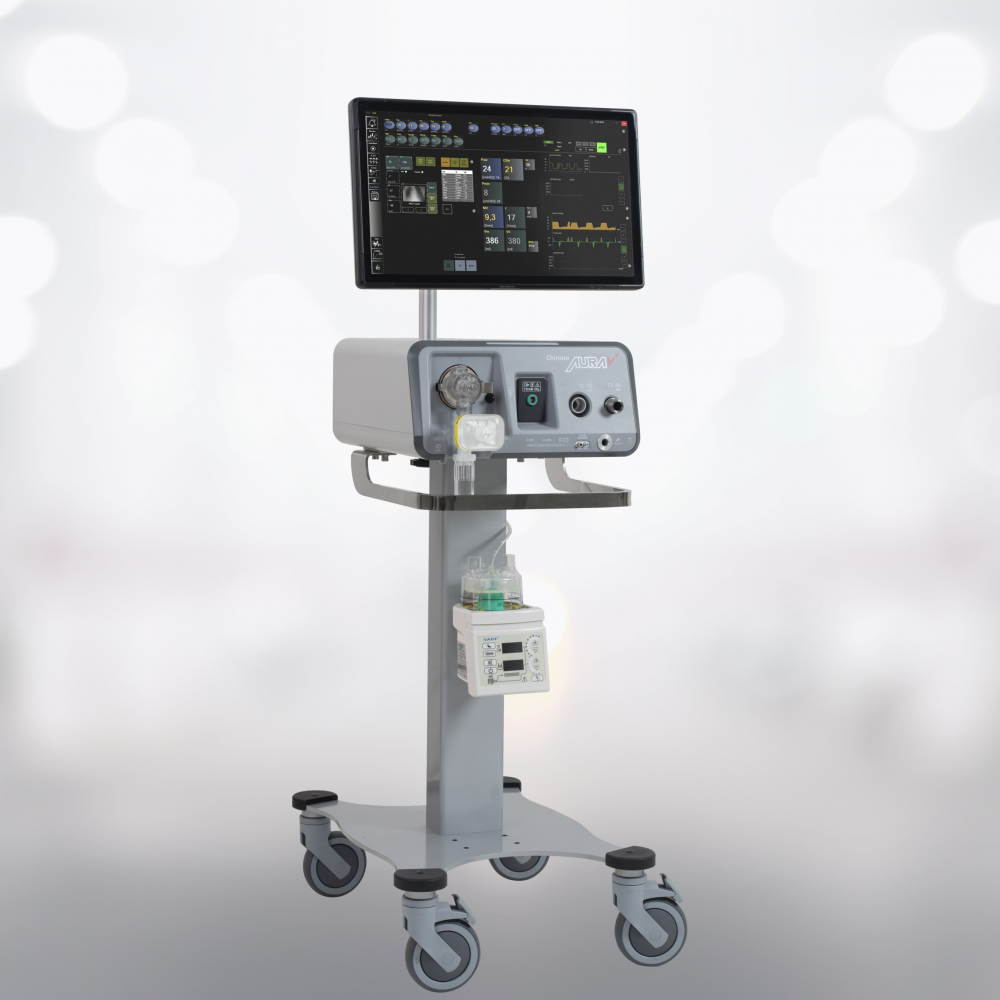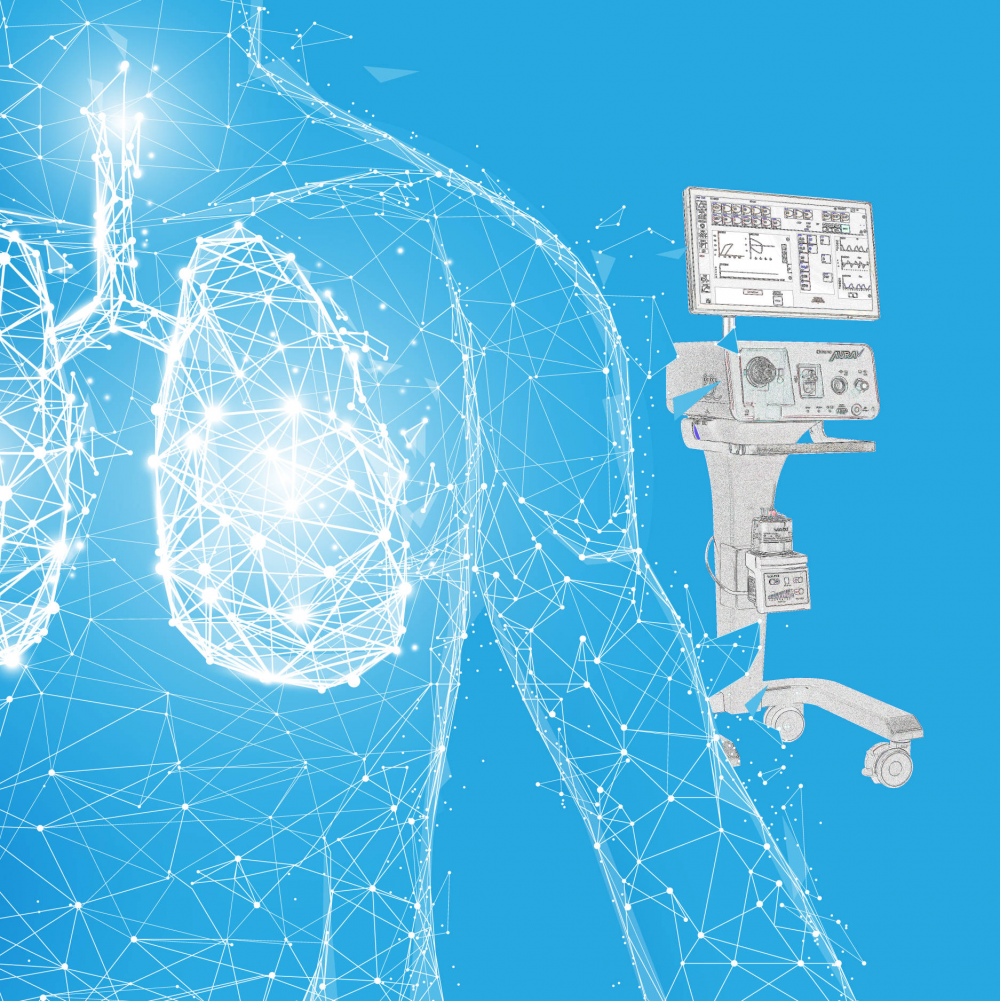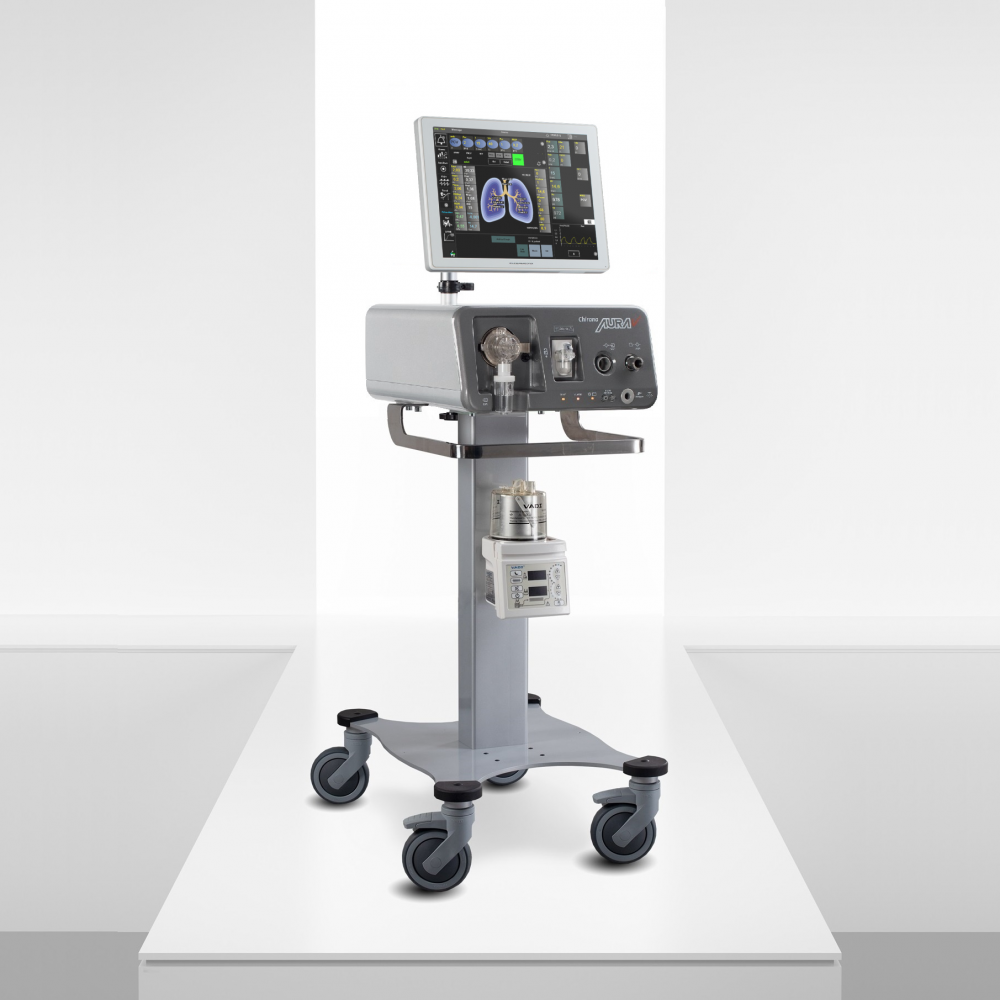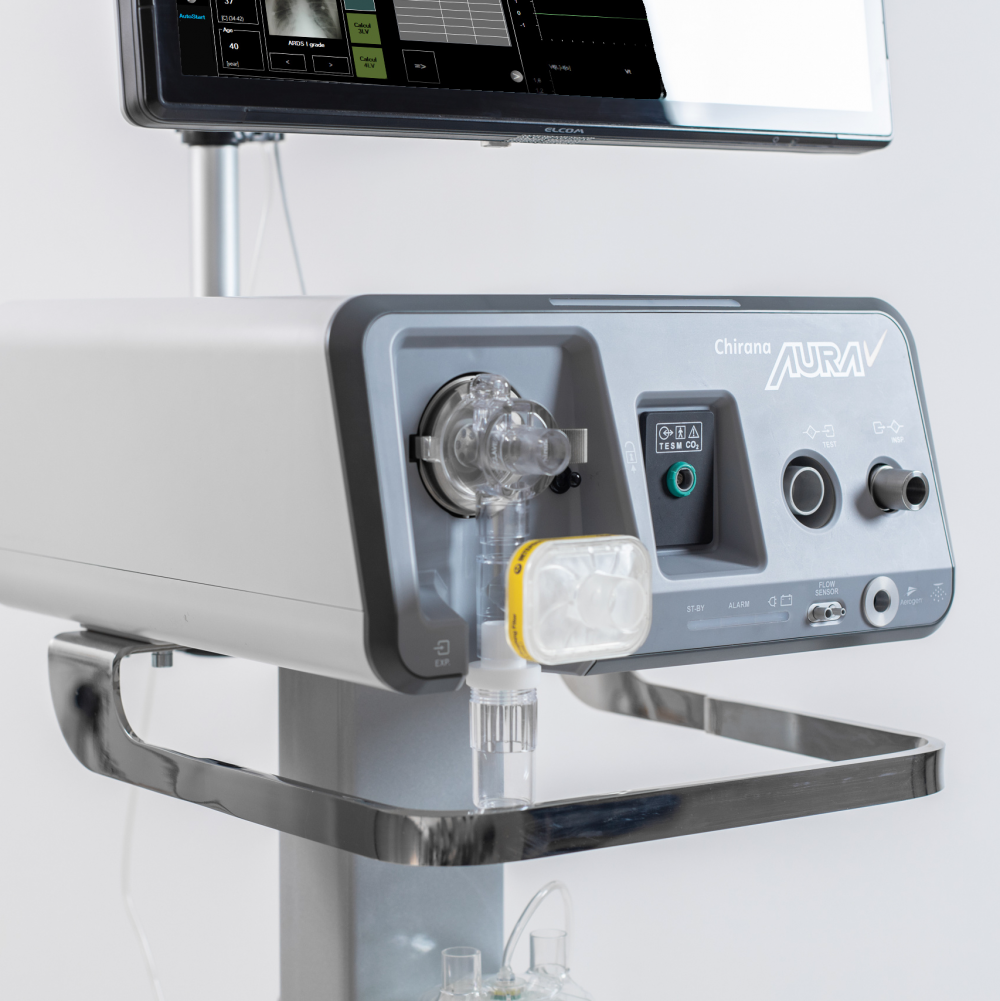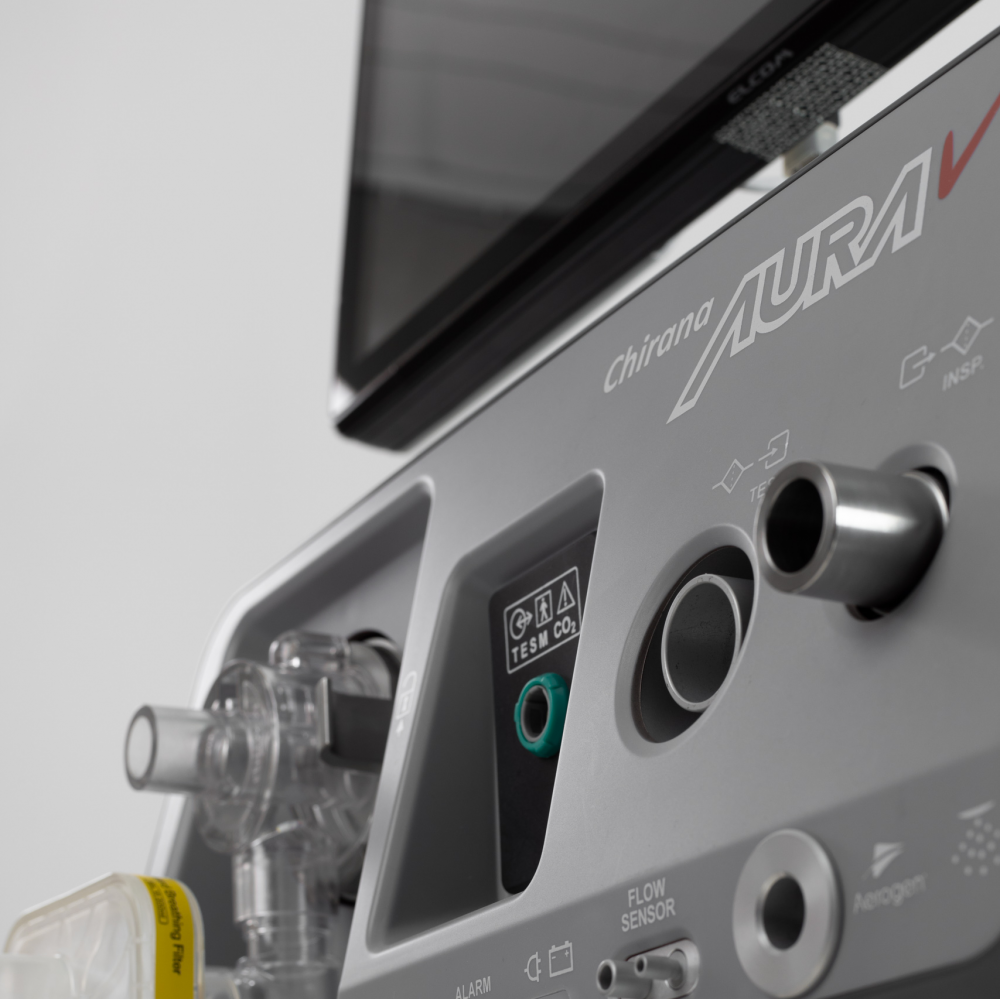
Chirana AURA V
Unique concept for unique solutions!

Chirana AURA V represents the highest level of ventilation system with above-standard ventilation modes for a variety of situations and for all ranges of patients. This is only one universal breathing unit which provides complete solution in basic equipment and it gives the priority to the efforts of patient to eliminate stress breathing. The advanced respiratory system is able to automatically compensate the dead space, compliance and resistance of breathing circuit. In-built artificial intelligence provides many automatic options including optimization of ventilation parameters based on on-line monitoring of breathing system mechanics what is resulted in better synchronization with patient and significant reducing of recovery time, elimination of potential complications and shorter weaning periods. The programmed multi-level ventilation mode using variable volume, variable pressure and variable time is unique method for ventilation of hardly damaged lungs from the pathology leading to inhomogeneous gas distribution (viral pneumonia, ALI, ARDS, contusion, etc.). The numerous features and functions are predetermined to deliver personalized, non-traumatic artificial ventilation adapted to the patient needs.
In previous waves of the COVID-19 pandemic, the high efficiency of the unique PMLV ventilation regime has been confirmed. In clinical practice, the treatment of COVID-19 (intubated patients) with a mortality of less than 20% has been achieved with the AURA V device using our recommended treatment methodology.
-
CMV - continuous mandatory /mechanical/ ventilation
-
SCMV - synchronized continuous mechanical ventilation
-
PC V - pressure controlled ventilation
-
SPCV - synchronized pressure controlled ventilation
-
SIMV(V)+PS – volume controlled artificial inspirium with pressure supportSIMV(P)+PS – pressure controlled artificial inspirium with pressure support
-
PS – pressure support
-
APRV (BIPAP) – airway pressure release ventilation
-
2-Level – two level ventilation (Bilevel, BiPAP, DuoPAP)
-
2-Level+PS – ventilation at two pressure levels with pressure support at both pressure levels
-
CPAP – continuous positive airway pressure
-
nCPAP - continuous pressure in the respiratory tract at spontaneously ventiled patient, without the weight limit with the nasal application
-
PMLV® - programmed multi level ventilation
-
HFM CPAP – high frequency modulated CPAP for application at childrem below 5 kg of weight
-
APMV® (MVs) – automatic proportional minute volume – self-adaptive regulative system based on maintaining the selected minute ventilation MV
-
CFvS® - continuous flow support
-
SIGH – Sigh (deep breath)
-
PS-VG - pressure support volume guaranted or called PS-CMV
-
PC-VG- presssure control volume guarranted
-
SIMV-VG - synchronized intermittent mandatory ventilation volume guarranted
-
BIPAP (2LV)-VG - two level ventilation volume guarranted
-
PMLV®-VG - programmed multi level ventilation volume guarranted
Power supply:
-
O2, AIR supply pressure 2,8-6 bar
-
max. inspiration flow 240 l.min-1 O2=120 l/min AIR=120 l/min
-
electirc power supply TN-S 110 - 240 V, 50/60 Hz
-
battery 12 V/ 8 Ah Pb
-
running time on own resource at default parameters 4 hours
Ventilation parameters:
-
Tidal volume: 2 – 2 000 ml
-
breathing frequency: 1 – 180/ min.
-
minute ventilation: 0,1 – 35 l/min.
-
ratio Ti:Te, %: 10 – 90% ( 1:299 - 9:1)
-
inspiration pause: 0 - 75%
-
concentration O2: 21 - 100%
-
PEEP: 0 - 5 kPa
-
Sigh: OFF , OFF,10 to 100 settable by 10
-
Inspiration flow: 240 l/min
-
Trigger sensitivity: 1 - 20 l/min flow
0,1 - 1,5 kPa pressure
-
bias-flow: 1 - 30 l.min-1, OFF
-
display: touchscreen 15“ or 21.5"
-
O2 Cell - Standard: Galvanic / Optional: Paramagnetic
-
pressure – paw,
-
tidal volume Vt,
-
minute ventilation MV,
-
minimal pressure pmin = PEEP,
-
medium pressure,
-
concentration FiO2
-
concentration inspirium/expirium CO2MIN and CO2MAX
-
frequency f,
-
T/M – activity of patient breathing
-
Metabolics of patient
The graphs on the display:
-
pressure curve,
-
P/V curve
-
flow curve,
-
Q/V curve
-
volumetric curve,
-
P/V curve,
-
Q/V curve
-
CO2 curve
Monitoring the mechanical properties of the lung:
-
Time constant period of inspirium and expirium,
-
peak alveolar pressure,
-
alveolar pressure of end-tidal PEEP,
-
alveolar pressure
-
Auto PEEP,
-
static lung compliance,
-
dynamic lung compliance.
-
inspiration resistance of airways and ventilation system
• There is implemented a three-level system of alarms
• Alarm system works through sound and light signals to the display and remembering causes
• sophisticated system for extreme situations, allowing when you enter the patient's weight, to make a quick start appliance in ventilation modes CMV
• Auto-start ventilation system
• Integrated electronic fan provides increased protection against hypoxic mixture
• Secure Electronic Control FiO 2
• When oxygen supply disruption, the device makes the air ventilation from a source of compressed air or external compressor
• on-line monitoring of the mechanical properties of the lung
